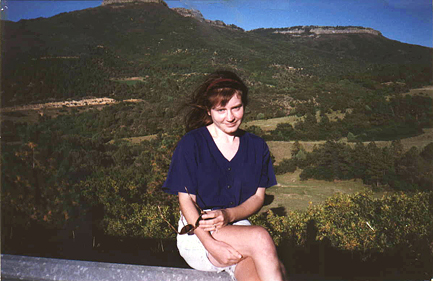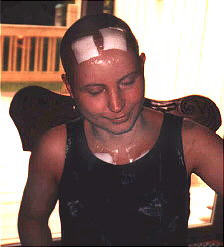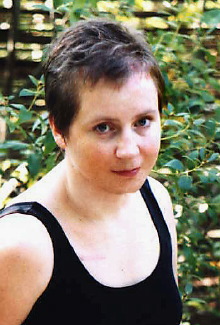
Before DBS/STN
 Meet a Butterfly | A butterfly's search The butterfly emerges from a cocoon - it has transformed from a worm to something beautiful. It flits in gardens, looking for other butterflies. When it finds another, it is ecstatic and so they fly together, spiral up the sky. And so I search for like-minded butterflies, people like me -- people with butterfly hands... people with Parkinson's disease. |
| A butterfly's life PD has taken me on a journey through shock, pain, apathy, and divorce. It has denied me children. It has taken my body and abused it over and over. It took my mother, dx at age 30, dead at 35. I'm 34, dx at 25. My mother was told to take a valium in her day. I'm a high tech marvel -- i have dbs/stn, bi-lateral, and very effective. | A new butterfly I am running my mother's race. She died way too soon, but she ran for as long as she could -- I have so many more options. I have so much more hope for the long run. My race is toward the cure, which I know is on the way. That day, I will put down this baton and slip on out of these shoes. |

Soon After Deep Brain Stimulation:
Summer 2002

Fall 2002
|
| I recently was on a panel with some other young onsetters for a conference a Northwestern University. I thought my notes woulld be worthwhile reading and so i am posting them here: I remember working as a journalist in Coffeyville, Kan. My typing speed plummeted - my fingers had turned slow, as if they had lost their will. Then I lost the natural swing of my right arm, and it curled rigid and stiff against my body. I remember thinking if I could just make it to Labor Day, I'd have a week-long vacation and plenty of time to de-stress and come back to work calm and fine - I didn't make it to Labor Day. Nine years ago, at age 25, I cried in the doctor's office after learning the probable truth: Parkinson's disease. By this time, it was hard for me to type or do much of anything. Parkinson's disease had me in its grip and played my body like a fiddle. We danced our dance and there was no shutting off the music. I call it "our" dance because though I hate to admit it, I am on intimate terms with PD. The symptoms are of course PD (tremor, rigidity, shuffled and hard to control gait, contortions of muscles, difficulty initiating movement), but the way they are expressed depends on who I am and how my body burns or tolerates the medications. Not everyone with PD develops the freakish chorea (defined by Webster's as "a wild, frenetic dance) as I did as a side effect of Sinemet. At my worst, I thrashed and flailed uncontrollably. I blackened my eyes with my knees. I hit my face on the counter top and broke my nose along with four front teeth, which turned to powder that I spit out at the bathroom sink. Chorea can be something to watch. My grandmother and I still talk about how I bent down to tie my shoe on a walking trail one morning and landed a perfect back flip. Chorea, in me, is a direct side effect of levodopa therapy. It is a medical problem all by itself, and is probably more dangerous than PD. It got to the point where I said to my doctor, I just want to get around and live without bashing my head in. I could be thinking differently. I could mourn my lost life, wonder what I would have done, what I could have become. I've cried over my loss: My work as a journalist. My life in Kansas. Graduate school. My marriage to a man I once considered my "soul mate." My independence. My capacity to cook, to use a knife, to eat without assistance, to brush my teeth, to drive…I've learned certain things in life are privileges, not to be taken for granted. I've been able to work through the loss and I am done with my mourning. First, I'm very forgiving of myself and say that I've done the best that I could at the time, all the way through. Then, I've come to realize that every life is of equal value. Whether I write ten novels or sit like a bump on a log all day or all week doesn't matter. My importance in this world does not increase or diminish with the plentitude or the lack of what I consider to be accomplishments. I've learned to just be in the moment for whatever its worth. I've learned how to "be." I'm not sure if this means I necessarily have a positive attitude or not, but this mode of thinking and believing has carried me through some rough times. Underneath all that I've been through with PD, I have found a strong will to keep my dignity intact and to go and to be wherever I choose. Some days, I have more choices than others, and I must surround myself with people who understand this. I'm lucky to have a friend who pretty much knows me inside-out and accepts me for who I am. The symptoms do not define me, but they certainly are a part of me and our days together. There are very intricate ways Mark helps me. It's a delicate balance - helping me or allowing me to help myself. Maybe he can twirl spaghetti on my fork, but I can lift it to my mouth. Perhaps I have trouble getting toothpaste on the brush, but I can brush my teeth just fine. Maybe I can take a bath, but have trouble lathering the shampoo into my hair. At times, I can look real shaky, but am still able to drink from a glass or take my meds on my own. These may seem like small things, but they are large to me - it is a juggling game between my dignity and my independence. Both are fragile things and it hurts when either one of them tumbles and breaks. The Dhali Lama writes about the art of happiness - and I completely agree that happiness is in fact an art form. A smile always makes me feel better, even a planned and deliberate one. Of course, this is important for those of us with PD and stony faces. We don't want to look angry or bored all of the time. It's strange when our outside doesn't reflect the way we feel inside. One of the scary things about Parkinson's is that it is "progressive." But so is everything in life, for the worst or for the best. There's no way to tell one from the other sometimes. For example, my divorce devastated me. I couldn't see why it had to happen. Now, looking back, I see that I really made it hard on myself. I know at the time that it was the last thing I wanted, even when he insisted on it. The way life progressed, there was no way the marriage could survive…so we lost it and our vows came undone. Typical, isn't it? The "not me" and "why me" attitudes in the same breath. It can be dangerous to apply them to PD. I just don't wrestle with them. "Not me" is quite an arrogant way to think and even if I knew the answer to "why me?" what would I do with it? Display it in a trophy case? "Not me" and "why me?" are very small questions in such a huge universe. There is no answer - not in this life anyway. When we get older, we start to interpret our childhood through adult eyes and we begin to hold grudges, get angry, feel gypped. Don't interpret PD with adult eyes. Try to hold onto your innocence. Laugh when you can. Smile if you're able. And don't take the blame for anything that doesn't turn out right. Closing thought about caring for people with pd: Freud said the eyes are the windows to the soul - try to find our souls. |